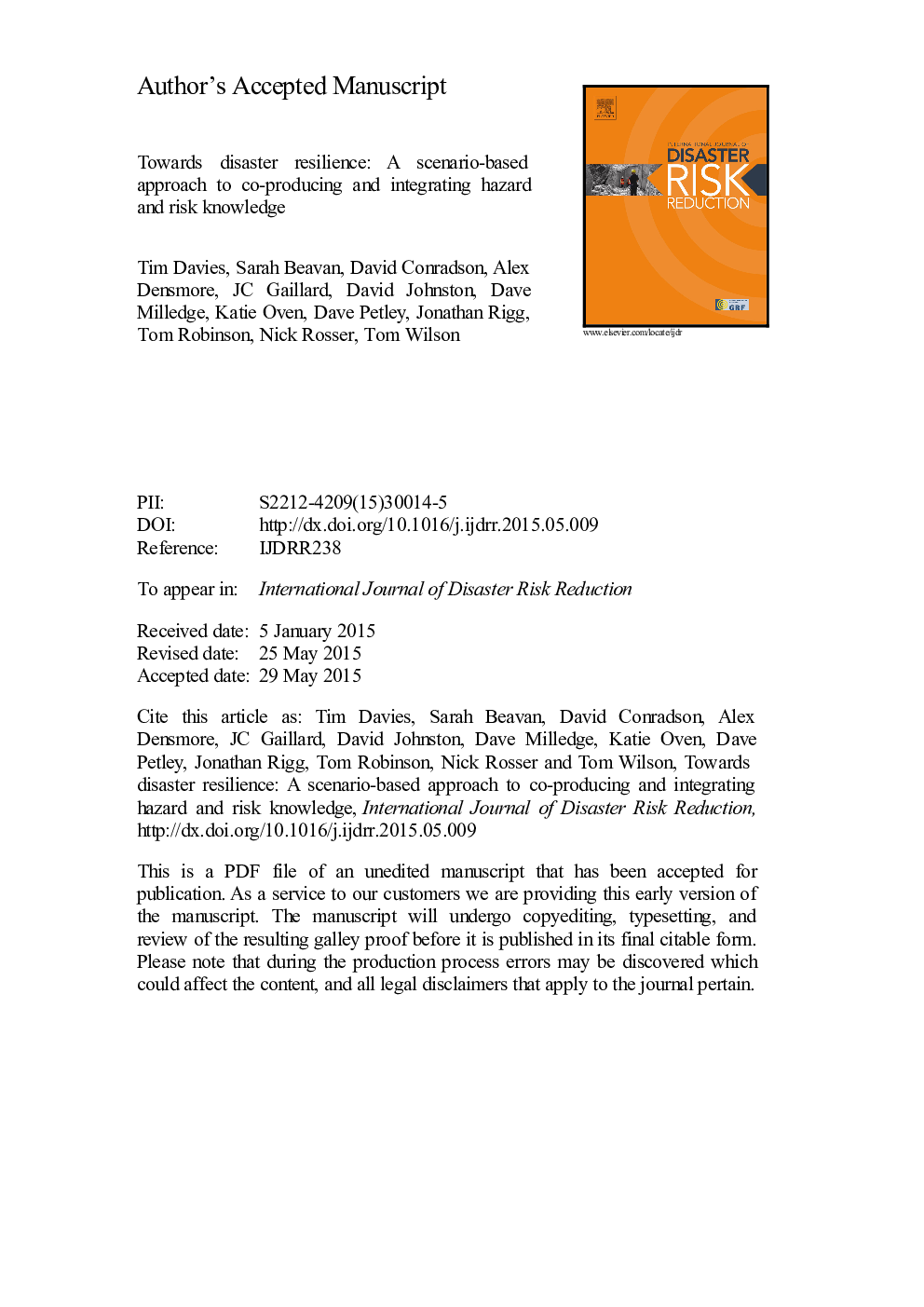| کد مقاله | کد نشریه | سال انتشار | مقاله انگلیسی | نسخه تمام متن |
|---|---|---|---|---|
| 7473187 | 1485160 | 2015 | 22 صفحه PDF | دانلود رایگان |
عنوان انگلیسی مقاله ISI
Towards disaster resilience: A scenario-based approach to co-producing and integrating hazard and risk knowledge
ترجمه فارسی عنوان
به سوی انعطاف پذیری فاجعه: یک رویکرد مبتنی بر سناریو برای تولید و ادغام خطر و دانش ریسک
دانلود مقاله + سفارش ترجمه
دانلود مقاله ISI انگلیسی
رایگان برای ایرانیان
کلمات کلیدی
کمبود ریسک بحران، مدیریت ریسک، انعطاف پذیری جامعه، سناریوهای رویداد و اثرات، همکاری تولید دانش،
ترجمه چکیده
ارزیابی ریسک کمی و فرایندهای مدیریت ریسک در شرایط کاربرد پذیری آنها به رویدادهای آماری نادر و گاهی پیش بینی نشده که منجر به بلایای بزرگ می شوند، مورد بررسی قرار می گیرد. در حالی که ارزش زمانی که در مقیاس های منطقه ای یا بزرگتر توسط دولت ها و شرکت های بیمه استفاده می شود، این فرایندها مبنای منطقی برای کاهش تاثیرات بلایای بزرگ در سطح محلی (جامعه) را فراهم نمی کند، زیرا در هر حادثه ای رخ داده، وقوع آینده در یک زمان واقع گرایانه که توسط آمار دقیقا پیش بینی می شود. با توجه به اینکه استراتژی های منطقه ای و ملی برای کاهش بلایای طبیعی بدون اقدامات موثر در زمینه کاهش فاجعه محلی موثر نیست، این یک مشکل مهم است. در عوض، ما پیشنهاد می کنیم که جوامع، مقامات دولتی، سازمان های جامعه مدنی و دانشمندان می توانند از تیم ها برای ایجاد هماهنگ شدن رویداد خطرناک محلی و سناریوهای تاثیر گذار استفاده کنند، که در آن تیم ها می توانند برنامه های بلندمدت واقعی برای ایجاد انعطاف پذیری محلی را توسعه دهند. این برنامه ها همچنین ممکن است در کاهش اثرات سایر بلایای طبیعی باشد و احتمالا مزایای دیگری نیز برای بهبود پیشرفت علم، ارتباط و جذب و افزایش ارتباط بین دانشمندان و مردم است.
موضوعات مرتبط
مهندسی و علوم پایه
علوم زمین و سیارات
فیزیک زمین (ژئو فیزیک)
چکیده انگلیسی
Quantitative risk assessment and risk management processes are critically examined in the context of their applicability to the statistically infrequent and sometimes unforeseen events that trigger major disasters. While of value when applied at regional or larger scales by governments and insurance companies, these processes do not provide a rational basis for reducing the impacts of major disasters at the local (community) level because in any given locality disaster events occur too infrequently for their future occurrence in a realistic timeframe to be accurately predicted by statistics. Given that regional and national strategies for disaster reduction cannot be effective without effective local disaster reduction measures, this is a significant problem. Instead, we suggest that communities, local government officials, civil society organisations and scientists could usefully form teams to co-develop local hazard event and effects scenarios, around which the teams can then develop realistic long-term plans for building local resilience. These plans may also be of value in reducing the impacts of other disasters, and are likely to have the additional benefits of improving science development, relevance and uptake, and of enhancing communication between scientists and the public.
ناشر
Database: Elsevier - ScienceDirect (ساینس دایرکت)
Journal: International Journal of Disaster Risk Reduction - Volume 13, September 2015, Pages 242-247
Journal: International Journal of Disaster Risk Reduction - Volume 13, September 2015, Pages 242-247
نویسندگان
Tim Davies, Sarah Beaven, David Conradson, Alex Densmore, JC Gaillard, David Johnston, Dave Milledge, Katie Oven, Dave Petley, Jonathan Rigg, Tom Robinson, Nick Rosser, Tom Wilson,
